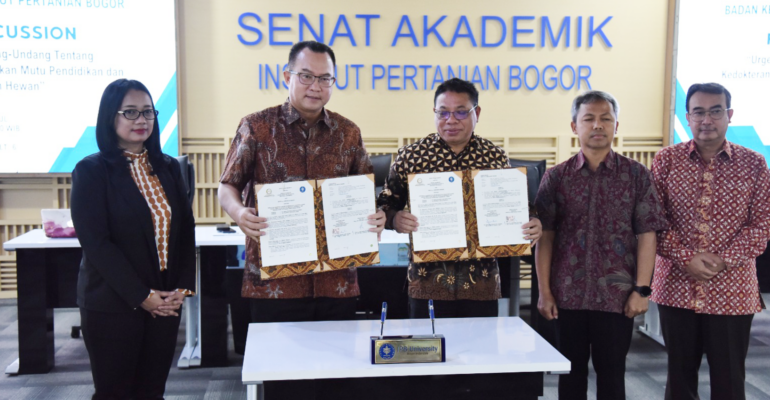Reviewing Veterinary Medicine Bill, IPB University Establishes Cooperation with Expertise Agency of DPR RI

IPB University signed a cooperation agreement with the Expertise Agency of House of Representatives (DPR) RI, Wednesday (27/3). This cooperation aims to improve the quality of education and the quality of veterinary services through the drafting of the veterinary medicine bill.
The Rector of IPB University, Prof Arif Satria, revealed that the Draft Veterinary Medicine Law must be based on a solid academic foundation through academic studies and research. Thus, the law will not merely be a political product but the result of in-depth research support from academics.
“The combination of politics and technocracy in drafting this law can take place harmoniously. The DPR has an important political role in this process as a forum for technocratic experts to contribute,” he said.
Prof Arif continued, the existence of various interests involved makes the contestation in the law-making process more complex. However, each stage provides an opportunity for the public to understand that the resulting law has been based on strong principles.
“This process can also provide an opportunity for the university world to show the positive impact of the law product on society and the business world,” he explained.
Prof Arif continued that veterinary medicine will have an important role as a savior in the future, especially considering the many diseases that come from animals.
“The unity between veterinary medicine and human medicine, through the concept of one health, is a critical foundation to view health holistically and not separately,” said Prof Arif.
Chairman of the Expertise Agency of The Indonesian House of Representatives, Dr Inosentius Samsul, said that the role of the Expertise Agency is very important in discussing and providing input related to certain fields in accordance with expertise and specialization.
According to him, this body has a huge responsibility, especially in the preparation of texts that will be debated with the government. “Criticism of the government must be done precisely and accurately to ensure there is a check and balance mechanism,” he said.
Dr Inosentius continued that cooperation with universities is very important to connect the academic world with the political world. This can ensure that the bills produced by the DPR are based on a strong theoretical and empirical foundation.
“We hope this cooperation can increase more intensively, especially in the context of drafting a bill on veterinary medicine. With the hope that the best input for this draft can be obtained and become a legal basis for strengthening and improving regulations on veterinary medicine,” he said.
This activity was followed by a focus group discussion (FGD), with a discussion on the urgency of drafting a bill on veterinary medicine as an effort to improve the quality of education and the quality of veterinary services. (dr/Rz) (IAAS/FAE)



